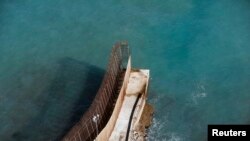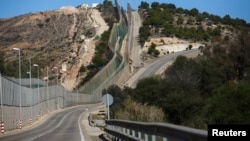MELILLA, SPAIN —
Yahya Khedr has traveled for more than two years, through five countries and with six forged passports to get his family from the war-ravaged Syrian city of Homs to Europe.
But now that his wife and five children have reached Melilla, a small Spanish enclave on Morocco's Mediterranean coast, their chance of a European life seems as remote as ever.
“People make it to Melilla hoping to find Europe,” said Khedr, who before his country's war owned a successful European truck-parts import business. “But here, it's an open-air jail.”
Armed guards and razor wire lining the 12-km (7.5-mile) frontier around the town have long discouraged Africans fleeing poverty and conflict from seeing Melilla as a gateway to Europe, 180 km (110 miles) away across open water.
But desperation has driven hundreds of Syrians like Khedr to brave long journeys — and Moroccan crime gangs that prey on migrants — to fetch up at the gates, turning the port town of 80,000 into a new pressure point for waves of destitute people struggling to reach the safety and prosperity of Europe.
As the United Nations marked International Migrants Day on Wednesday, drawing attention to governments' obligations toward people on the move, European Union leaders were preparing for a summit in Brussels on Thursday and Friday that is likely to approve tougher ways to keep immigrants out.
That will disappoint Spain, Italy and Greece, whose hope of persuading northern neighbors to share the burden of taking in those fleeing across the Mediterranean have been undermined by hostility among voters feeling the pinch of austerity policies.
Before an EU summit in October more than 360 people drowned within sight of Lampedusa, an Italian island off Tunisia that has long been a magnet for migrants. But talks on a more coordinated, EU-wide solution have made little progress.
“There is no master plan," said Ana Terron, an adviser to the EU home affairs commissioner and a former Spanish immigration minister. "It is an international problem that should be dealt with at a European level but there is a lack of will.”
Spain says that in the first half of this year it took in some 3,000 illegal migrants, twice the number in the first half of 2012. Most came via Melilla and its other main African enclave, Ceuta, where detention centers send asylum-seekers over to the Spanish mainland once they become too overcrowded.
About 2,300 have made it into Melilla so far this year.
The EU found over 72,000 people entering the bloc illegally last year, including a fivefold rise in Syrians, to 8,000.
Southern exposure
People fleeing conflict in the Middle East have long taken northern routes through Turkey, Greece and the Balkans in the hope of making it to richer states like Germany, Sweden or Britain. But tighter policing, especially around Greece and Italy, has driven more to head along more southerly routes.
This month, 74 Syrians were detained in Lisbon after flying in on fake passports from Guinea-Bissau, Morocco, and elsewhere.
Others push along the North African coast, through Libya and Algeria to Morocco and, they hope, into Melilla and Ceuta.
“Immigration is like water. It always seeks a way to flow,” says Jose Palazon, a Melilla teacher who heads Prodein, an organization that helps immigrants, especially the children who hide around the town's docks in the hope of sneaking aboard ferries and other ships heading for mainland Spain.
“If you close all waterways, the level goes up, like on a dam. Until it spills over,” Palazon said, likening that to the way migrants who camp out in the woods and hills around Melilla periodically try to rush the security fence to get inside.
While the likes of Yahya Khedr managed to sneak his family into the town, and so to its hostel for refugees, by using fake passports, hundreds of less well-off people, mostly Africans from south of the Sahara, camp outside, looking for a chance.
“In our countries, we live with less than one dollar a day,” said Serge, 30, from Cameroon, who has been surviving on the hillside outside Melilla for months. “Africa needs to be fixed if the immigration is to slow down. If nothing is done, it will only increase.”
Spain, where more than one worker in four is out of a job, has responded by reinforcing Melilla's six-meter (20-foot) border fence with razor wire. That drew criticism from human rights groups when migrants trying to climb over it were left slashed and hanging on the barrier.
The Spanish government representative in Melilla, Abdelmalik El Barkani, defended the measures as necessary and noted that few refugees wanted to register for asylum in the enclave, preferring to count on a transfer to mainland Europe.
Madrid has also stepped up cooperation with Moroccan police in the hope they can prevent people approaching the border.
Forged passports, fake tears
Yahya Khedr is despairing of ever getting there, however.
Three years ago, Khedr, now 43, was living well from his business importing European truck parts to Syria. He would spend several months a year in Murcia, in southern Spain, where he also owned a bar and ran his trading business.
He traveled elsewhere in Europe, too, taking his family to Disneyland in Paris or visiting a daughter who lives in Italy.
Now, much of his home city of Homs is rubble. Some of the first bombing of the civil war in 2011 destroyed his house and Khedr joined a Syrian refugee exodus now 2.3 million strong.
Holding a Spanish residence permit for himself only, he and the family flew and drove via Lebanon, Egypt, Libya and Algeria to Morocco. There he bought forged Moroccan passports for his wife and children to get them into Melilla in mid-October under Spanish rules that allow entry to Moroccans living nearby.
Typically, Syrian refugees say, Moroccan gangs charge $1,500 or more for a passport. Khedr did not say what he paid.
His family now lives with about 900 other migrants in the low-rise compound that forms Melilla's immigration holding center — designed to house little more than half that number.
He himself saves money by living for $12 a day in a hotel in the nearby Moroccan town of Nador. Using his Spanish permit, he is able to travel every week to visit his family in Melilla.
With no sign of being allowed to cross over to the Spanish mainland, however, Khedr now wonders whether he might even start heading back home.
“It's a catastrophe,” he said. “The Europeans say they're weeping for Syria but it's all fake.”
“It's a catastrophe,” he said. “The Europeans say they're weeping for Syria but it's all fake.”






